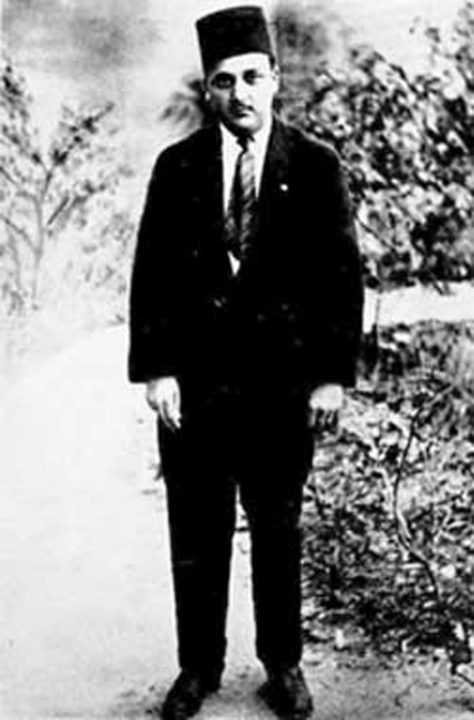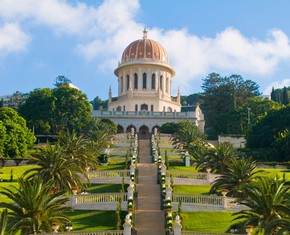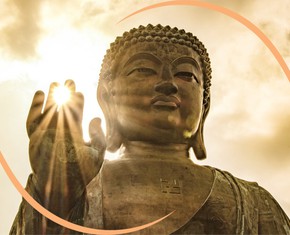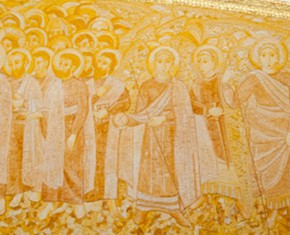The views expressed in our content reflect individual perspectives and do not represent the authoritative views of the Baha'i Faith.
As you might imagine, the dawn of a new Faith – the Baha’i revelation – did not go unchallenged at its birth. Many people doubted and opposed the Baha’i message, including the spouses of some Baha’is.
Abdu’l-Baha also sent another Arabic tablet to Mirza Sadiq, the husband of devoted Baha’i Fa’izih Khanum and the skeptic who had earlier challenged him to prove his superhuman knowledge:
He is God
O thou who art putting Abdu’l-Baha to the test! It is not for thee to test a servant who ardently supplicateth the Lord. Hast thou not read what the most learned of men have said in the common lore, wherein it is forbidden unto the seeker of truth to test the object of his quest—the one who summoneth him to God?
In spite of this, I will speak to thee of the truth by resorting to figures of speech. The lamp is a light that shineth upon the world and is not bound to anyone, be he blind or sighted, for the nature of light is to be manifest. The nature of the sea, moreover, is to surge; it is the nature of the ship to serve as a vehicle, and the nature of its passengers to ascend as they embark it. Furthermore, it is the nature of the cloud to rain copiously, and that of the garden to flourish, and that of the breeze to blow gently.
Having said all this, is it permissible to doubt the manifestation of that which was once invisible? No, by thy Lord, the All-Merciful! Beholdest thou not the blind who have seen, or the deaf who have heard, or the mute who have spoken, or the dead who have risen? The proof is now complete. Is there, after this, any room for doubt or suspicion? No, by God!
Upon thee be praise and salutations. – Majmuʻiy-i-Mubarakih, pp. 198-199, provisionally translated by the author (thanks to Ruwa Pokorny and Taleen Jameel for their helpful comments on this translation).
Abdu’l-Baha wrote these tablets no later than 1896, the year when Mirza Sadiq and Faʼizih Khanum made their pilgrimage to the Holy Land after receiving Abdu’l-Baha’s permission to do so in yet another tablet, this one in Persian, to Mirza Sadiq – who by this point had clearly embraced the Baha’i Faith. Here is that tablet, provisionally translated below:
He is the All-Glorious
O servant who believest in God! Render thanks to the Lord, inasmuch as thou hast quaffed the stream of bounty flowing from the wellspring of guidance, and beheld the splendors of the Sun of Truth shining from the horizon of heavenly favors. Indeed, thou hast fled the wayward caravan and reached the right path; thou hast rolled up thy sleeves and scattered the pearls of spiritual wealth upon the world and its peoples.
Such a thing as this had never happened until now—that by means of a test, one should seek something from a servant of God or ask something of him and then receive an answer. Peruse thou the verses of the Qurʼan. Yet this servant hath considered the pains thy wife hath taken—her noble efforts to serve the prisoners and captives, her endurance in the face of various calamities along with the censure of the enemy—and in spite of the fact that thou didst pose thy questions in the form of a test, I wrote a response nonetheless. From this very thing, thou shouldst know that her toil hath not been in vain; rather, at the hallowed threshold of the Kingdom, and also in the sight of this servant and that of the bondslaves of the All-Merciful, it is remembered and well known. The glory of God rest upon thee.
Permission is hereby granted to thee and thy faithful wife to make pilgrimage to the holy Shrine of Bahaʼuʼllah. – Makatib-i-Hadrat-i-Abdu’l-Baha, Volume 6, pp. 32–33, provisionally translated by the author.
Abdu’l-Baha also referred to the blank letter from Mirza Sadiq in a Persian Tablet to Faʼizih Khanum:
He is the All-Glorious
O handmaid of God! Thy toil is commendable in the sight of the Lord, and thy hardships are remembered and well known. Think not that there is anything hidden or unknown, or any matter which is unclear. A blank letter bearing no signature or any other writing whatsoever was sent from Tihran, and a response that addressed the intent and question of its author was written. Hence, it is evident that the difficulties thou hast faced are apparent and worthy of praise. Rest thou assured and rejoice with exceeding gladness.
The glory of God rest upon thee. – Ibid., p. 177, provisionally translated by the author.
In the third sentence – “think not that there is anything hidden or unknown, or any matter which is unclear” – it seems Abdu’l-Baha is speaking to his own “superhuman knowledge,” as Shoghi Effendi put it. This should not escape our attention; there are several accounts in Baha’i lore, mostly written by others who describe this extraordinary power, but precious few come from the pen of Abdu’l-Baha himself.

What is remarkable about this story more generally is that we have an account from the memoirs of an eyewitness, Mirza Habibu’llah Afnan, who was present when Abdu’l-Baha initially received Mirza Sadiq’s blank letter and responded to it. According to Mirza Habibu’llah, it arrived as one of a number of letters from Iran:
“The Master [Abdu’l-Baha] then opened an envelope and stated that it contained a blank piece of paper. He smiled and then said, “The servants [of God] wish to test us. May the day never come when God wishes to test His servants!” He took up His pen immediately and revealed a Tablet on that same piece of paper, which He then sent to be mailed. This paper had been sent by Aqa Siyyid Muhammad-Sadiq, the husband of Faʼizih Khanum, who decided after much debate to entertain some questions in his heart and send a blank letter to the Master. If the Master was able to answer the questions and problems he had kept to himself, and write those answers on that same piece of paper, he would accept the blessed Cause. In the end, the Master did write a response; the problems [of Aqa Siyyid Muhammad-Sadiq] were solved, and he came to believe in the Faith.” – Mirza Habibu’llah Afnan, Khatirat-i-Mirza Habibu’llah Afnan, p. 123.
After reading about this remarkable episode in Baha’i history, we might do well to ask ourselves: “Who are we to subject our fellow humans to spiritual tests, let alone test the Mystery of God?”
















Comments
Sign in or create an account
Continue with Googleor